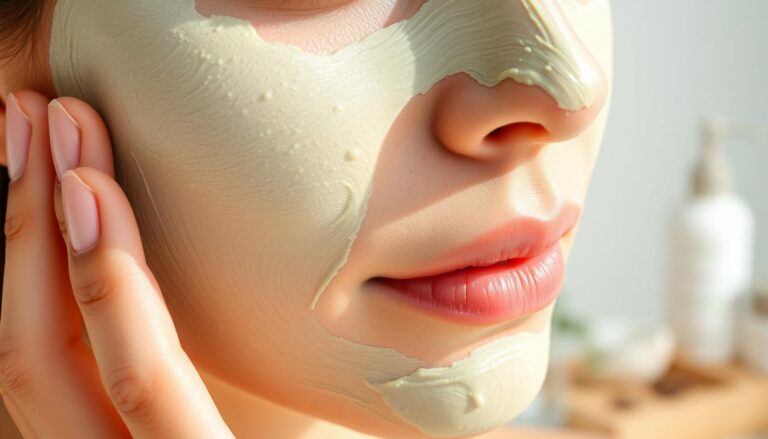At Glowskinhub.com, we believe beauty isn’t just a look—it’s a feeling
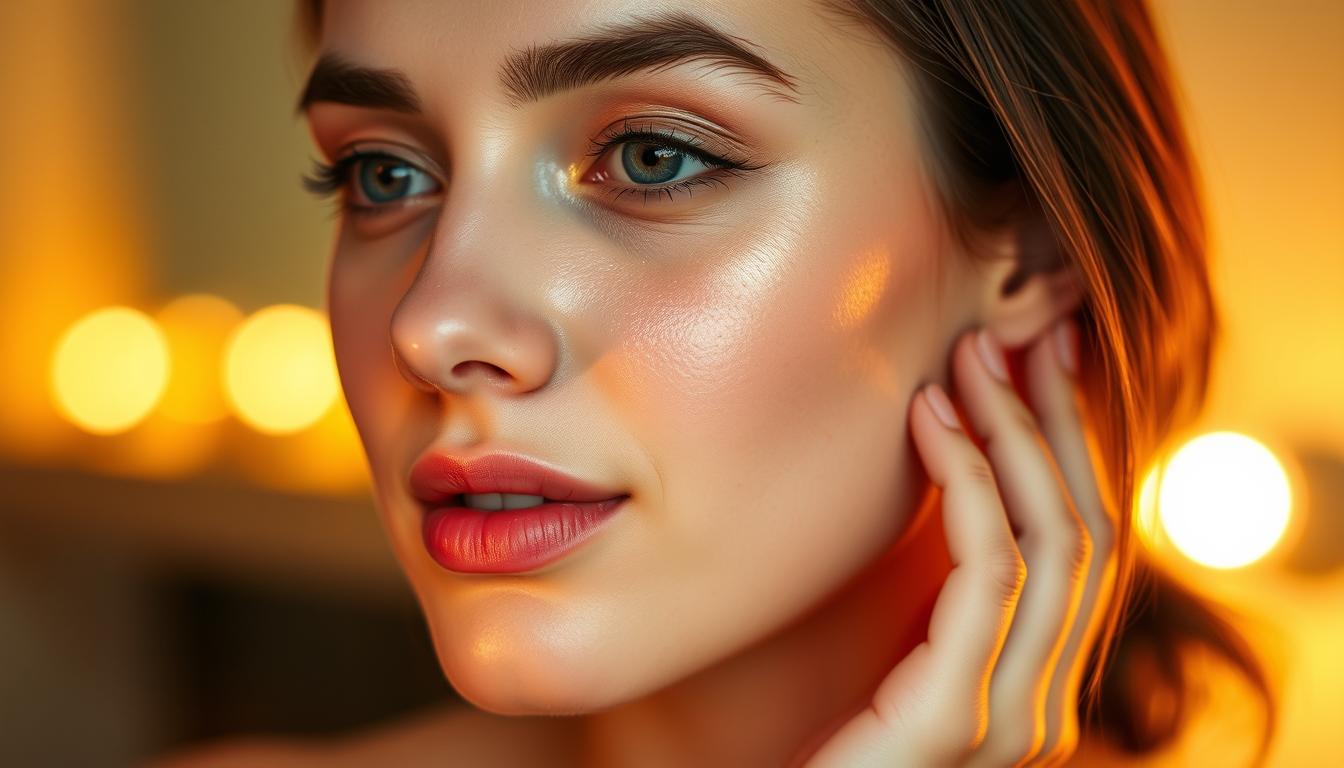
Night skincare routine for glowing skin
A well-planned skincare routine is essential for achieving glowing Skin. During the night, your Skin undergoes a natural repair process, making it the perfect time to nourish and rejuvenate it.
By incorporating a consistent night skincare regimen, you can wake up to radiant and healthy-looking Skin. This involves a series of steps that help to cleanse, nourish, and protect your Skin.
Key Takeaways
- Establish a consistent night skincare regimen for optimal results.
- Cleanse your Skin thoroughly to remove dirt and impurities.
- Nourish your Skin with the right products to promote healthy Skin.
- Protect your Skin from environmental stressors and damage.
- Get ready to wake up to radiant and healthy-looking Skin.
The Science Behind Night-time Skin Renewal
As we sleep, our Skin undergoes a natural renewal process that can be supported and enhanced with the right skincare routine. This process is crucial for maintaining healthy, glowing Skin.

How Skin Repairs Itself During Sleep
During sleep, the Skin’s cellular repair mechanisms are in full swing. The Skin’s natural barrier function is restored, and any damage caused by environmental stressors during the day is repaired. This process involves the production of new collagen and the removal of damaged cells.
Why Night Skincare Differs from Day Routines
Night skincare routines focus on repair and regeneration, whereas daytime routines are more about protection. At night, the Skin can benefit from more intensive treatments, such as exfoliants and nourishing masks, which might not be suitable for daytime use.
By understanding the science behind night-time Skin renewal, individuals can tailor their skincare routines to maximize the benefits of their Skin’s natural repair processes, leading to healthier and more radiant Skin.
Benefits of a Consistent Night Skincare Routine for Glowing Skin
To achieve the coveted glowing complexion, it’s vital to stick to a consistent night skincare routine. This consistency is key to reaping both immediate and long-lasting benefits for your Skin.
Short-term Benefits
In the short term, a consistent night skincare routine can lead to improved Skin texture and a more even tone. Your Skin may appear brighter and more radiant, giving you that glowing Skin you’ve been striving for.
Long-term Skin Health Improvements
Over time, a well-maintained night skincare routine contributes to long-term Skin health improvements. This includes reduced fine lines, improved Skin elasticity, and better hydration levels. For those with oily Skin, a consistent routine can help regulate oil production, making the best skincare routine for oily Skin one that balances cleansing and moisturizing.
| Benefit | Short-term | Long-term |
|---|---|---|
| Improved Skin Texture | ✔ | ✔ |
| Reduced Fine Lines | ✔ | |
| Regulated Oil Production | ✔ | |
| Enhanced Radiance | ✔ | ✔ |

Essential Steps in a Night Skincare Routine for Glowing Skin
A well-structured night skincare routine can significantly improve Skin health. By following a consistent regimen, individuals can address various Skin concerns and achieve a radiant complexion.
Step-by-Step Breakdown
A typical night skincare routine involves several key steps. Cleansing is the first step, which removes dirt, makeup, and impurities from the Skin. This is followed by toning, which helps balance the Skin’s pH and prepares it for subsequent products.
The next steps include applying serums or treatments that target specific Skin concerns such as acne, aging, or hyperpigmentation. Moisturising is also crucial, as it helps lock in previous steps and hydrate the Skin.
- Cleansing: Remove dirt and makeup
- Toning: Balance Skin pH
- Serums/Treatments: Target specific Skin concerns
- Moisturising: Hydrate and lock in previous steps
Order of Product Application
The order of product application is vital for maximum efficacy. Generally, products should be applied from thinnest to thickest consistency. This ensures that each product is absorbed properly without being blocked by thicker formulations.
“The order of your skincare products matters. Apply products in the correct order to achieve the best results.”
Adapting Steps for Different Skin Types
Different Skin types require tailored approaches. For oily Skin, it’s essential to use lightweight, oil-free products that won’t clog pores. Dry Skin benefits from richer, more hydrating formulations. Sensitive Skin requires gentle, Fragrance-free products to minimize irritation.

By understanding your Skin type and adjusting your routine accordingly, you can maximize the effectiveness of your night skincare routine.
Cleansing: The Foundation of Your Night Routine
The foundation of an effective night skincare regimen is a proper cleansing method. Cleansing is crucial for removing dirt, makeup, and impurities that accumulate on the Skin throughout the day, which if left unchecked, can lead to clogged pores and dull Skin.
Double Cleansing Method
Double cleansing involves using two types of cleansers: an oil-based cleanser followed by a water-based cleanser. The oil-based cleanser effectively removes makeup and sebum, while the water-based cleanser cleans the Skin more thoroughly, removing any remaining impurities.
Benefits of Double Cleansing:
- Effective removal of makeup and sunscreen
- Deep cleansing without stripping the Skin of its natural oils
- Improved Skin clarity and reduced risk of clogged pores
Best UK Cleansers for Different Skin Types
Choosing the right cleanser depends on your Skin type. Here are some top recommendations for different Skin types available in the UK.
| Skin Type | Recommended Cleanser | Key Ingredients |
|---|---|---|
| Normal/Dry | Cetaphil Gentle Skin Cleanser | Glycerin, Panthenol |
| Oily | Niu Cleansing Gel | Tea Tree Oil, Salicylic Acid |
| Sensitive | La Roche-Posay Toleriane Ultra Fluid | Caffeine, Shea Butter |
Cleansers for Oily Skin
For oily Skin, it’s essential to use a cleanser that controls sebum production without drying out the Skin. Niu Cleansing Gel is a popular choice, containing tea tree oil and salicylic acid to help reduce acne and prevent future breakouts.
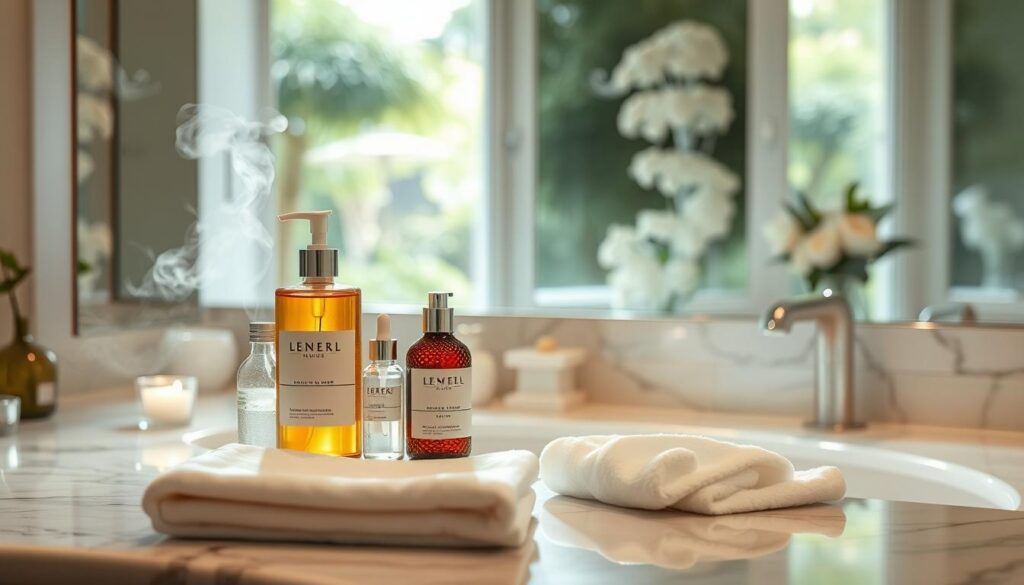
Exfoliation: Removing Dead Skin Cells for Radiance
Removing dead Skin cells through exfoliation is vital for achieving a smoother and brighter complexion. Exfoliation helps to unclog pores, reduce the appearance of fine lines, and improve Skin texture, making it an essential step in any effective night skincare routine.
Chemical vs. Physical Exfoliants
There are two primary types of exfoliants: chemical and physical. Chemical exfoliants, such as alpha-hydroxy acids (AHAs) and beta-hydroxy acids (BHAs), dissolve the ‘glue’ that holds dead Skin cells together, allowing for a gentle yet effective removal. On the other hand, physical exfoliants, like scrubs and brushes, manually remove dead Skin cells through friction.
According to skincare expert, Dr. Joshua Zeichner, “Chemical exfoliants are great for those with sensitive Skin as they can be less irritating than physical exfoliants.” However, it’s crucial to choose the right type of exfoliant based on your Skin type.
Frequency Recommendations
The frequency of exfoliation depends on your Skin type and the type of exfoliant used. For most Skin types, exfoliating 1-3 times a week is sufficient. However, those with sensitive Skin may need to limit exfoliation to once a week or less.
Exfoliation Tips for Oily Skin
For individuals with oily Skin, incorporating a chemical exfoliant containing salicylic acid can help control oil production and reduce acne. It’s also advisable to exfoliate at night, as this can help remove dirt and oil that accumulates throughout the day.
“Exfoliating regularly can make a significant difference in the appearance of your Skin, especially for those with oily Skin.”
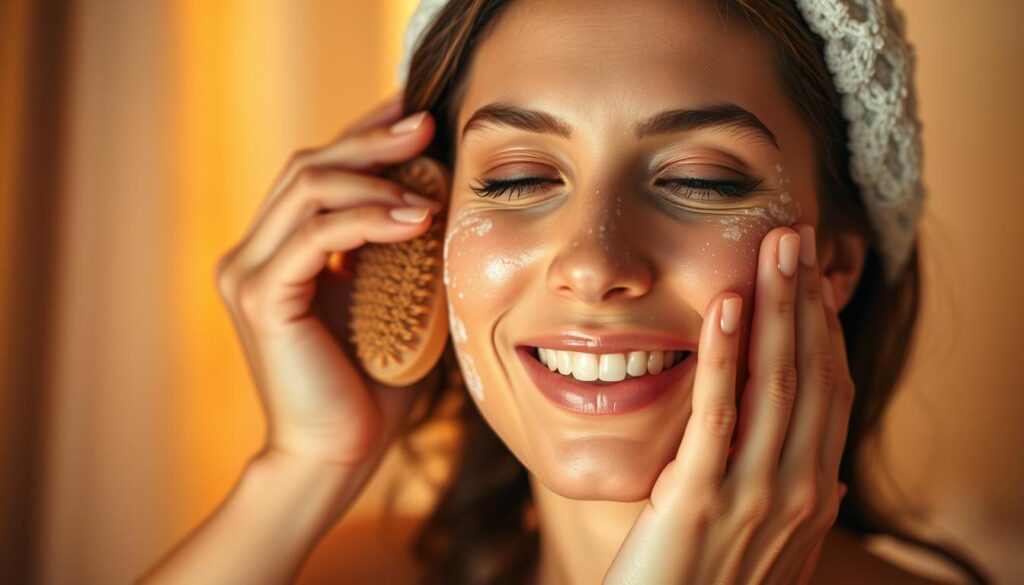
Serums and Treatments: Targeted Solutions
To achieve glowing Skin, serums and treatments play a pivotal role in a comprehensive night skincare routine. These products are formulated with concentrated ingredients that address specific Skin concerns, such as acne, hyperpigmentation, or fine lines.
Serums are lightweight, easily absorbed liquids that contain a high concentration of active ingredients. They are designed to penetrate deep into the Skin, providing targeted solutions for various Skin issues.
Essential Ingredients for Glowing Skin
When choosing serums, look for products containing hyaluronic acid, vitamin C, or retinol. Hyaluronic acid helps retain moisture, vitamin C brightens and protects the Skin, and retinol stimulates collagen production and cell turnover.
- Hyaluronic Acid: Provides intense hydration
- Vitamin C: Antioxidant properties, brightens Skin
- Retinol: Stimulates collagen production, improves Skin texture
How to Layer Multiple Serums
Layering multiple serums can be beneficial, but it requires a strategic approach. Start with the Serum having the thinnest consistency and gradually move to thicker formulations. This ensures that each product is absorbed effectively without diluting their efficacy.
- Begin with a Serum that has the smallest molecular structure (usually water-based)
- Follow with serums of slightly thicker consistency
- Finish with the thickest Serum or treatment product
Best Serums for Oily Skin Available in the UK
For oily Skin, serums with salicylic acid or niacinamide can be particularly beneficial. They help control sebum production and reduce inflammation. Some recommended serums include:
- Salicylic Acid Serum: Helps in exfoliating the Skin, unclogging pores
- Niacinamide Serum: Improves Skin elasticity, reduces inflammation
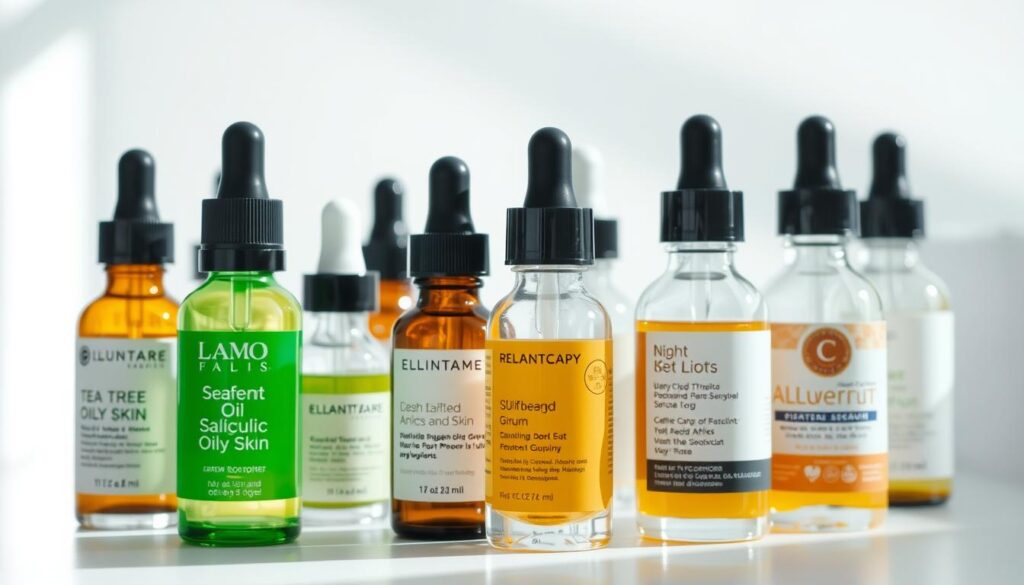
The Perfect Night Skincare Routine for Glowing Skin
The key to radiant, healthy-looking Skin lies in a consistent and tailored night skincare routine. By understanding your Skin type and its specific needs, you can create a routine that addresses your concerns and leaves you with glowing Skin.
Sample Routine for Normal to Dry Skin
For normal to dry Skin, a night skincare routine should focus on hydration and nourishment. Begin with a gentle cleanser, followed by a toner to balance your Skin’s pH. Then, apply a Serum rich in hyaluronic acid to lock in moisture.
A sample routine could be:
| Step | Product | Purpose |
|---|---|---|
| 1 | Cleanser | Remove dirt and makeup |
| 2 | Toner | Balance Skin pH |
| 3 | Serum | Hydrate and nourish |
| 4 | Moisturiser | Lock in moisture |
Sample Routine for Combination Skin
Combination Skin requires a delicate balance between controlling oil production and hydrating the Skin. Start with a gel cleanser, followed by a lightweight toner. Apply a Serum that regulates oil production and hydrates the Skin.
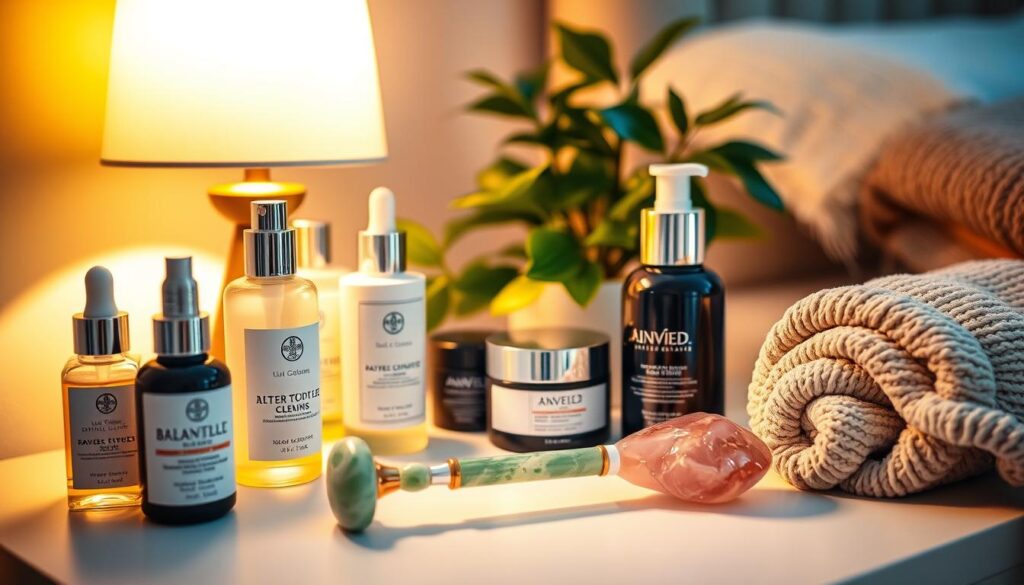
| Step | Product | Purpose |
|---|---|---|
| 1 | Gel Cleanser | Clean without drying |
| 2 | Lightweight Toner | Balance Skin pH |
| 3 | Serum | Regulate oil production |
| 4 | Moisturiser | Hydrate without clogging |
Sample Routine for Sensitive Skin
Sensitive Skin requires gentle, Fragrance-free products to avoid irritation. Begin with a cream cleanser, followed by a soothing toner. Apply a calming Serum to soothe and protect the Skin.
A sample routine could be:
| Step | Product | Purpose |
|---|---|---|
| 1 | Cream Cleanser | Gently clean |
| 2 | Soothing Toner | Calm the Skin |
| 3 | Calming Serum | Soothe and protect |
| 4 | Moisturiser | Nourish and protect |
Best Skincare Routine for Oily Skin at Night
Oily Skin requires a distinct approach to night skincare, one that balances oil control with nourishment. A well-crafted routine can help manage excess oil production while ensuring the Skin remains hydrated and healthy.
Common Misconceptions About Oily Skin
A common misconception about oily Skin is that it doesn’t need moisturiser. However, depriving oily Skin of moisture can lead to increased oil production as the Skin tries to compensate for the dryness. “Using the right moisturiser is crucial for oily Skin,” says a renowned dermatologist, “as it helps to balance the Skin’s natural moisture barrier.”
Another misconception is that oily Skin is not susceptible to aging or dryness. In reality, oily Skin can still suffer from dehydration and requires proper care to maintain its health and appearance.
Oily Skin Moisturiser Options
For oily Skin, it’s essential to choose a moisturiser that is lightweight and non-comedogenic. Gel-based moisturisers are often recommended as they provide hydration without clogging pores. Products containing hyaluronic acid or glycerin are also beneficial as they help retain moisture without adding excess oil.
When selecting a moisturiser, look for products labeled “oil-free” or “non-acnegenic” to ensure they are suitable for oily Skin.
Balancing Oil Production While You Sleep
To balance oil production during sleep, it’s crucial to exfoliate regularly to remove dead Skin cells and unclog pores. Using a cleanser containing salicylic acid or benzoyl peroxide can help control oil production and reduce acne.
Additionally, incorporating a clay-based mask once or twice a week can help absorb excess oil and purify the Skin.
By understanding the specific needs of oily Skin and incorporating the right products and techniques into your night skincare routine, you can achieve a balanced and healthy complexion.
Special Treatments: Masks, Oils and Overnight Products
To take your night skincare routine to the next level, consider incorporating special treatments like masks and overnight serums. These products can provide an intense dose of nourishment and repair, addressing specific Skin concerns such as dryness, acne, or hyperpigmentation.
When to Incorporate Special Treatments
Special treatments should be used judiciously, depending on your Skin type and concerns. For instance, if you have dry Skin, you might benefit from a hydrating mask once or twice a week. Those with oily Skin might prefer clay masks to control sebum production.
Overnight Masks for Intensive Repair
Overnight masks are a great way to provide your Skin with an intense dose of hydration or treatment while you sleep. Look for products containing ingredients like hyaluronic acid, peptides, or niacinamide, which can help in Skin repair and rejuvenation.
Oily Skin Treatment Options
For oily Skin, it’s essential to choose products that won’t clog pores. Consider using lightweight, oil-free overnight masks or serums containing salicylic acid or tea tree oil, which can help control oil production and reduce acne.
By incorporating the right special treatments into your night skincare routine, you can address specific Skin concerns and wake up to healthier, more radiant Skin.
Seasonal Adjustments to Your Night Routine in the UK Climate
Adapting your night skincare routine to the changing UK seasons is crucial for maintaining healthy, glowing Skin. The UK’s climate varies significantly throughout the year, impacting Skin health and necessitating adjustments to your skincare regimen.
The changing weather conditions can affect your Skin’s moisture levels, oil production, and overall health. Therefore, it’s essential to modify your night skincare routine to address these seasonal changes effectively.
Winter Skincare Modifications
During the winter months, the cold weather and low humidity can dry out your Skin. To combat this, consider:
- Increasing the moisturizing properties of your night routine
- Using richer, more hydrating products
- Avoiding harsh exfoliants that can strip your Skin of its natural oils
Summer Skincare Adaptations
In the summer, the warmer weather and higher humidity can lead to increased oil production and sweat. To manage this, you can:
- Switch to lighter, oil-free products
- Exfoliate more frequently to keep pores clear
- Use products containing antioxidants to protect your Skin from sun damage
Dealing with UK Weather Fluctuations
The UK is known for its unpredictable weather, with sudden changes in temperature and humidity. To cope with these fluctuations, it’s essential to:
- Be prepared to adjust your skincare routine as needed
- Use versatile products that can adapt to different conditions
- Keep your Skin hydrated and protected at all times
Common Night Skincare Mistakes to Avoid
Even with the best intentions, our night skincare routines can be marred by errors that affect their efficacy. A well-informed approach can help mitigate these issues.
Over-exfoliation and Product Overuse
Over-exfoliation can lead to irritation and compromise the Skin’s barrier function. It’s essential to exfoliate appropriately based on your Skin type. For instance, those with sensitive Skin may need to limit exfoliation to once a week, while others might benefit from more frequent exfoliation.
Product overuse is another common mistake. Using too many products can lead to clogged pores and irritation. Simplify your routine and use products judiciously, ensuring each product addresses a specific Skin concern.
Timing Issues and Sleep Considerations
The timing of your skincare routine can significantly impact its effectiveness. Applying products too close to bedtime can reduce their absorption. Allow at least 30 minutes between application and sleep to ensure optimal absorption.
Moreover, adequate sleep is crucial for Skin health. Ensure you’re getting enough restful sleep to help your Skin regenerate and repair itself.
Specific Mistakes for Oily Skin Types
For those with oily Skin, over-washing can be a common mistake, leading to increased oil production. Use a gentle cleanser and avoid harsh products that strip the Skin of its natural oils.
Another mistake is not using a suitable moisturizer. Even oily Skin needs moisturizing to maintain its barrier function. Opt for a lightweight, oil-free moisturizer that won’t clog pores.
Conclusion: Creating Your Perfect Night Skincare Regimen
Establishing a consistent night skincare routine is crucial for achieving glowing Skin. By understanding your Skin type and concerns, you can create a personalized regimen that addresses your specific needs.
A well-planned night skincare routine involves a combination of essential steps, including cleansing, exfoliation, and targeted treatments. By incorporating these steps and adapting them to your Skin type, you can improve Skin health and radiance.
To create your perfect skincare regimen, consider your Skin concerns, such as acne, dryness, or hyperpigmentation. Choose products that contain ingredients tailored to your needs, and don’t be afraid to adjust your routine as your Skin changes.
By following the guidelines outlined in this article and being consistent with your night skincare routine, you can achieve the glowing Skin you desire. A perfect skincare regimen is not a one-size-fits-all solution; it’s about finding what works best for you and making it a part of your daily routine.

